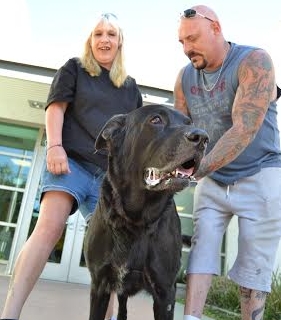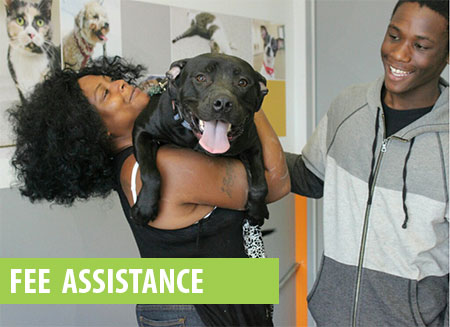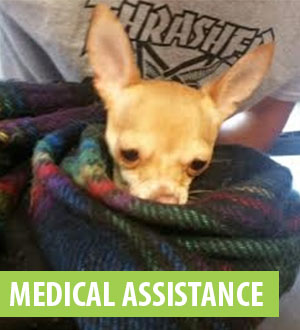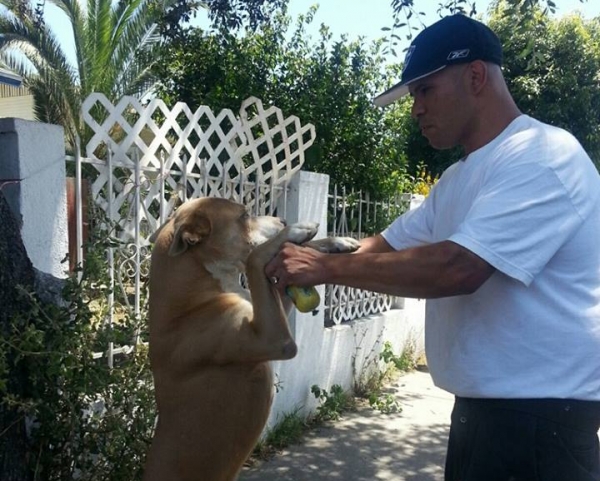The #1 reason pets are surrendered: “I’m moving and I can’t take my pet.” But, why?
One of the most common reasons why people surrender their animals is: “I’m moving and I can’t take my pet.” In 2014, across the six Los Angeles Animal Services shelters, a total of 296 cat owners and 835 dog owners cited moving as the reason for turning in their dog or cat. The other most common reasons that followed were having no home at all (claimed by 20 cat owners and 72 dog owners) and landlord issues (245 cats and 955 dogs came into the system due to this problem.) Over the years, we’ve heard many passionate, animal-loving people say that these owners “dumped their pets in the shelter.” But I can’t help wonder — did they?
Please consider that many of the families that we serve earn less than $20,000 per year for a family of four. Consider that the average family earning minimum wage will spend 141 percent of their income struggling just to meet the most basic needs of food, shelter, and clothing. Now consider the choices they have to make — not necessarily that they want to make — when it comes to their lives and their animals.
Surely there is a percentage of people who never connected with their pet in the first place, and who should never should have acquired the pet to begin with. Perhaps moving was just an excuse used to surrender their animal to the shelter. However, based on our experiences at the South LA Shelter, this isn’t the case the majority of the time. We know differently. We see that most people do care. And they’re doing the best they can.
 Princess and Bruno are a good example of what we do. They were brought into the South LA shelter by their owner in tears. He never thought he would find himself in the situation he was in — out of work, with poor credit, having lost his home, and with no prospect of a permanent place to live. Their owner was basically homeless when a generous friend offered him a room to rent, on one condition: He could not bring his dogs. Fortunately for this man, our counselor Amanda was able to find foster homes for Princess and Bruno, and with the help of our volunteers Jennifer and Mia, we were able to find them loving forever homes. We were all too glad to help. But the point is, if their owner had not been in the financial state he was in, these two dogs would have never needed to be rescued. They had a loving home to begin with.
Princess and Bruno are a good example of what we do. They were brought into the South LA shelter by their owner in tears. He never thought he would find himself in the situation he was in — out of work, with poor credit, having lost his home, and with no prospect of a permanent place to live. Their owner was basically homeless when a generous friend offered him a room to rent, on one condition: He could not bring his dogs. Fortunately for this man, our counselor Amanda was able to find foster homes for Princess and Bruno, and with the help of our volunteers Jennifer and Mia, we were able to find them loving forever homes. We were all too glad to help. But the point is, if their owner had not been in the financial state he was in, these two dogs would have never needed to be rescued. They had a loving home to begin with.
According to Congresswoman Maxine Waters,“We have known for quite some time that there are widespread generational and systemic factors that exacerbate the racial wealth gap.” So why isn’t this income gap part of a larger discussion, especially when it comes to planning programs that save pets’ lives? Why aren’t we focused on narrowing the gap, which would benefit both people and animals?
Many of you, our cherished supporters, donated to help Nicole, her daughter […]



 One of the most common questions I’ve been asked for almost twenty years now is: If a person can’t take care of themselves and their family, why should they have a pet?
One of the most common questions I’ve been asked for almost twenty years now is: If a person can’t take care of themselves and their family, why should they have a pet? For example, this little dog (pictured left) was almost surrendered to the South LA Shelter for having seizures. The family paid for an exam and were told by the veterinarian that his condition could be very expensive, including daily medicine and more testing. Despite not wanting to surrender “their baby,” the family felt they had no choice. They could not afford the treatments and procedures. That’s where our shelter intervention program stepped in and offered financial assistance in order to help keep one more little brown Chihuahua from coming into the shelter. Because this dog had a home and a loving family who wanted him. Should they be deemed unworthy of having a pet simply because they couldn’t afford his extreme health condition? We don’t think that’s fair. We believe in opening our hearts to animals, and the people who love them.
For example, this little dog (pictured left) was almost surrendered to the South LA Shelter for having seizures. The family paid for an exam and were told by the veterinarian that his condition could be very expensive, including daily medicine and more testing. Despite not wanting to surrender “their baby,” the family felt they had no choice. They could not afford the treatments and procedures. That’s where our shelter intervention program stepped in and offered financial assistance in order to help keep one more little brown Chihuahua from coming into the shelter. Because this dog had a home and a loving family who wanted him. Should they be deemed unworthy of having a pet simply because they couldn’t afford his extreme health condition? We don’t think that’s fair. We believe in opening our hearts to animals, and the people who love them. Furthermore, we know that the only thing constant is change. The family mentioned above who is living in poverty with their dog may work their way up and out of their current financial situation. They may be able to one day support themselves without assistance, and it could happen in a matter of months or a couple years. We hope it does. But the life expectancy of a Chihuahua is 15-18 years. Therefore, in theory, any dog in any family […]
Furthermore, we know that the only thing constant is change. The family mentioned above who is living in poverty with their dog may work their way up and out of their current financial situation. They may be able to one day support themselves without assistance, and it could happen in a matter of months or a couple years. We hope it does. But the life expectancy of a Chihuahua is 15-18 years. Therefore, in theory, any dog in any family […]

 charge by the week, allowing pets. When Roscoe was diagnosed with parvo, despite being close to two years old, his family barely had enough money to pay their weekly motel fees. Taking him to a vet was not a possibility. With no money and no transportation DDR was the only place for his family to turn to. Another one of our special families, who also lives in the motel, gave Roscoe’s family a ride to the vet where Roscoe was treated.
charge by the week, allowing pets. When Roscoe was diagnosed with parvo, despite being close to two years old, his family barely had enough money to pay their weekly motel fees. Taking him to a vet was not a possibility. With no money and no transportation DDR was the only place for his family to turn to. Another one of our special families, who also lives in the motel, gave Roscoe’s family a ride to the vet where Roscoe was treated.




